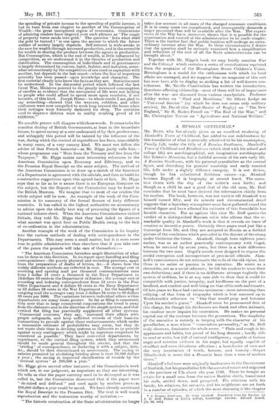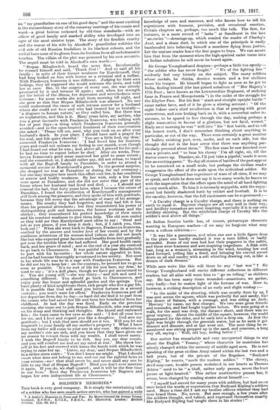A RUSSIAN GENTLEMAN.*
Ms. DUFF, who has already given us an excellent rendering of Aksakoff's Years of Childhood, has added to our indebtedness by this translation of what is generally admitted to be his masterpiece, Family Life, under the title of A Russian Gentleman. Aksakoff's Years of Childhood and Recollections (which deal with his school and college life) are autobiographical, not imaginative autobiography like Tolstoi's Memoires, but a faithful account of his own early life. .4 Russian Gentleman, with his paternal grandfather as the central figure, and describing his parents' courtship and early married life, falls under a slightly different category. It is not fiction, though he has substituted fictitious names—e.g.. Aksakoff becomes Bagroff—it is biography at second hand. The narra- tive closes with the day of the writer's own birth ; and though as a child he saw a good deal of the old man, Mr. Duff concludes that he must have derived the information chiefly from his mother. The book, however, was not written till Aksakoff was himself turned fifty, and its minute and circumstantial detail suggests that a legendary atmosphere must have gathered round the central figure and have affected his estimate of this formidable but lovable character. But as against this view Mr. Duff quotes the verdict of a distinguished Russian critic who affirms that the re- markable quality in Aksakoff's work is that it reveals no trace of creative or inventive power. Certainly these pages road just like a transcript from life, and they are accepted in Russia as a faithful picture of the conditions which prevailed in the district of Orenburg wider Catherine the Great. Aksakoff, though born eighteen years earlier, was as an author practically contemporary with Gogol, whom he survived by seven years, but there is a wide difference between the two men. Gogol's novels wore designed to expose the sordid corruption and incompetence of provincial officials. Aksa- koff's reminiscences do not extenuate the evils of the old reitione, but there is no satire or passion in his narrative. Ho wrote as a chronicler, not as a social reformer ; he left hiS readers to aistw their own deductions; and if there is no deliberate attempt to glorify the system of serfdom, he is at any rate able to show that it could be compatible with justice, integrity, and kindliness on the part of a landlord, and comfort and well-being on that of his serfs and tenants. Of late years wo have had various specimens—more interesting than edifying—of that form of biography which is best summed up in Wordsworth's reference to " One that would poop and botanize Upon his mother's grave." Aksakoff must be pronounced free of this charge, for though his disclosures aro frank and often intimate, his candour never impairs his veneration. He makes no personal capital out of the contrast between the generations. The simplicity of the narrative is entirely in keeping with the character of his grandfather, a man whose " tremendous personality," as Mr. Duff truly observes, dominates the whole scene. " Plain and rough in his appearance and habits, but proud of his long descent ; hardly able to read or write, but full of natural intelligence ; capable of furious anger and extreme violence in his anger, but equally capable of steadfast and even chivalrous affection ; a born leader of men and the very incarnation of truth, honour, and honesty—Stepan Mihailovitch is more like a Homeric hero than a man of modern times."
Aksakoff's forbears were originally landowners in the Government of Simbirak, but his grandfather loft the ancestral estate and migrated to the province of Ufa about the year 1780. There he bought an estate for a small sum from the native Baskhir chiefs, transferred his serfs, settled down, and prospered. His relations with his family, his relatives, his servants, and his neighbours are set forth in a number of episodes, of which the most charming is the chapter • A Marian Genlirnzan. Dy Serge Akaakoff. Translated from the Itn3slan by J. D. Dolt Fellow of Trinity College. Cambridge. London: Edward Arnold. Fe. ed. net]
on " my grandfather on one of his good days," and the most exciting is the extraordinary story of the runaway marriage of his cousin and ward—a groat heiress reckoned by old-time standards—with an officer of good family and marked ability who developed into an ogre of the most sinister type. The story of his fiendish cruelty and the rescue of his wife by Aksakoff's grandfather exhibits the evil side of old Russian feudalism in its blackest colours, and the recital loses none of its gloom from its freedom from all melodramatic touches. The villain of the plot was poisoned by his own servants. The sequel must be told in Aksakoff's own words :- "Stepan Mihailovitch heard the news first. Involuntarily he crossed himself and said, Thank God ! ' And so said all his family : in spite of their former weakness for Kurolyessoff, they had long looked on him with horror as a criminal and a ruffian. With Praskovya Ivanovna it was different. Judging by their own feelings, they all supposed she would welcome the news, and told her at once. But, to the surprise of every one, she was utterly prostrated by it and became ill again ; and, when her strength got the better of the illness, her depression and wretchedness were extreme : for some weeks she wept from morning till night, and she grew so thin that Stepan Mihailovitch was alarmed. No one could understand the cause of such intense sorrow for a husband whom she could not love and who had treated her so brutally- ' a disgrace to human nature,' as they called him. But there was an explanation, and this is it. Many years later, my mother, who was a great favourite with Praskovya Ivanovna, was talking with her of past days—a thing which Praskovya Ivanovna generally avoided—and in the open-hearted frankness of their conversation she asked : Please tell me, aunt, why you took on so after your husband's death. In your place, I should have said a prayer for
his soul, and felt quite cheerful.' You are a little fool, my dear,' answered Praskovya Ivanovna ; I had loved him for fourteen years and could not unlearn my feeling in one month, even though I had found out what he was ; and, above all, I grieved for his soul : he had no time to repent before he died.' After six weeks, Pras- kovya Ivanovna's good sense mastered her grief to some extent ; and she consented, or, I should rather say, did not refuse, to travel with all the Bagroff family to Parashino, in order to attend a memorial service at Kurolyessoff's grave. To the general surprise, she dropped no tear at Parashino or during the sad ceremony ; but one may imagine how much this effort cost her, in her condition of sorrow and bodily weakness. By her wish, only a few hours wore spent at Parashino, and she did not enter that part of the house where her husband had lived and died. . . . I should not conceal the fact, that forty years later, when I became the owner of Parashino, I found the recollection of Kurolyessoff's management still fresh among the peasants, and they spoke of him with gratitude, because they felt every day the advantage of many of his arrange- ments. His cruelty they had forgotten, and they had felt it less than his personal attendants ; but they remembered his power of distinguishing guilt and innocence, the honest workman and the shirker ; they remembered his perfect knowledge of their needs and his constant readiness to give them help. The old men smiled as they told me that Kurolyessoff used often to say ' Steal and rob as you please, if you keep it dark ; but, if I catch you, then look out ' When she went back to Bagrovo, Praskovya Ivanovna, soothed by the sincere and tender love of her cousin and by the assiduous attentions of his woman-kind (whom she did not much like but who expected great favours and benefits from her) gradually got over the terrible blow she had suffered. Her good health came back, and her peace of mind ; and at the end of a year she resolved to go back to Choorassovo. It was painful to Stepan Mihailovitch to part with his favourite : her whole nature appealed to him, and he had become thoroughly accustomed to her society. Not once in his whole life was ho in a rage with Praskovya Ivanovna. But he did not try to keep her : on the contrary, he pressed her to go as soon as possible. It's no sort of life for you here, my dear,' he used to say ; it's a dull place, though we have got accustomed to it. You are young still '—she was thirty—' and rich and used to something different. You should go back to Choorassovo, and enjoy your fine house and splendid garden and the springs. You have plenty of kind neighbours there, rich people who live a gay life. It is possible that God will send you better fortune in a second venture ; you won't want for offers.' Praskovya Ivanovna put off her departure from day to day—so hard did she find it to part from the cousin who had saved her life and been her benefactor from her childhood. At last the day was fixed. Early on the previous morning, she came out to join Stepan Mihailovitch, who was sitting on his stoop and thinking sad thoughts. She kissed and embraced him ; the tears came to her eyes as she said : I feel all your love for me, and I love and respect you like a daughter. God sees my gratitude ; but I wish that men should see it too. Will you let me bequeath to your family all my mother's property ? What I have from my father will come to your son in any case. My relations on my mother's side are rich, and you know that they have given me no reason to reward them with my wealth. I shall never marry. I wish the Bagroff family to be rich. Say yes, my dear cousin, and you will comfort me and set my mind at rest.' She threw her- self at his feet and covered with kisses the hands with which he was trying to raise her up. Listen, my dear,' said Stepan Mihailovitch in a rather stern voice : You don't know me aright. That I should covet what does not belong to me, and cut out the rightful heirs to your estates—no ! that shall never be, and never shall any one be able to say that of Stepan Bagroff ! Mind you don't ever mention it again. If you do, we shall quarrel ; and it will be the first time in our lives. Next day Praskovya Ivanovna left Bagrovo and began her own independent life at Choorassovo."



























 Previous page
Previous page